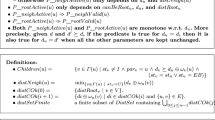Abstract
In the DO-ALL problem, a set of t tasks must be performed by using a synchronous network of p processors. Processors may fail by permanent crashing. We investigate the time and the work complexity of F-reliable protocols for the DO-ALL problem on 1-hop wireless networks without collision detection. An F-reliable protocol is a protocol that guarantees the execution of all tasks if at most F < p faults happen during its execution. Previous results for this model are known only for the case F = p - 1.
We obtain the following tight bounds.
-
- The completion time of F-reliable protocols on 1-hop wireless networks without collision detection is
$$ \Theta \left( {\frac{t} {{p - F}} + min\left\{ {\frac{{tF}} {p},F + \sqrt t } \right\}} \right). $$ -
- The work complexity of F-reliable protocols on 1-hop wireless networks without collision detection is
$$ \Theta \left( {t + F \cdot min\left\{ {t,F} \right\}} \right). $$
The two lower bounds hold even when the faults only happen at the very beginning of the protocol execution.
Access this chapter
Tax calculation will be finalised at checkout
Purchases are for personal use only
Preview
Unable to display preview. Download preview PDF.
Similar content being viewed by others
References
B.S. Chlebus, D.R. Kowalski (1999). Randomization helps to perform tasks on processors prone to failures. 13th DISC’99, LNCS, 1693.
B.S. Chlebus, D.R. Kowalski, and A. Lingas (2001). The Do-All problem in Broadcast networks, ACM-PODC’01.
B.S. Chlebus, R. De Prisco, and A.A. Shvartsman (2001). Performing tasks on synchronous restartable message-passing processors. Distributed Computing, 14, 49–64.
C. Dwork, J. Halpern, and O. Waarts (1998). Performing work efficiently in the presence of faults, SIAM J. on Computing, 27, 1457–1491.
R. De Prisco, A. Mayer, and M. Yung (1994). Time-optimal message-efficient work performance in the presence of faults, ACM PODC’94, 161–172.
Z. Galil, A. Mayer, and M. Yung (1995). Resolving message complexity of byzantine agreement and beyond, IEEE FOCS’95, 724–733.
D. Gelernter and D. Kaminsky (1992). Supercomputing out of recycled garbage: preliminary experience with Piranha. ACM Int. Conf. on Supercomputing, 417–427.
J.D. Gibson (Ed.) (1996). The Mobile Communications Handbook, CRC Press.
P.C. Kanellakis, and A.A. Shavartsman (1992). Efficient Parallel Algorithms Can Be Made Robust, Distributed Computing,5, 201–217.
P.C. Kanellakis, and A.A. Shavartsman (1997) Fault-Tolerant Parallel Computation, ISBN 0-7923-9922-6, Klunder Academic Publishers.
J.F. Shoch and J.A. Hupp (1982). The Worm programs — early experience with a distributed computation, Comm. Assoc. Comput. Mach., 25, 95–103.
Author information
Authors and Affiliations
Editor information
Editors and Affiliations
Rights and permissions
Copyright information
© 2002 Springer-Verlag Berlin Heidelberg
About this paper
Cite this paper
Clementi, A.E.F., Monti, A., Silvestri, R. (2002). Optimal F-Reliable Protocols for the Do-All Problem on Single-Hop Wireless Networks. In: Bose, P., Morin, P. (eds) Algorithms and Computation. ISAAC 2002. Lecture Notes in Computer Science, vol 2518. Springer, Berlin, Heidelberg. https://doi.org/10.1007/3-540-36136-7_29
Download citation
DOI: https://doi.org/10.1007/3-540-36136-7_29
Published:
Publisher Name: Springer, Berlin, Heidelberg
Print ISBN: 978-3-540-00142-3
Online ISBN: 978-3-540-36136-7
eBook Packages: Springer Book Archive




